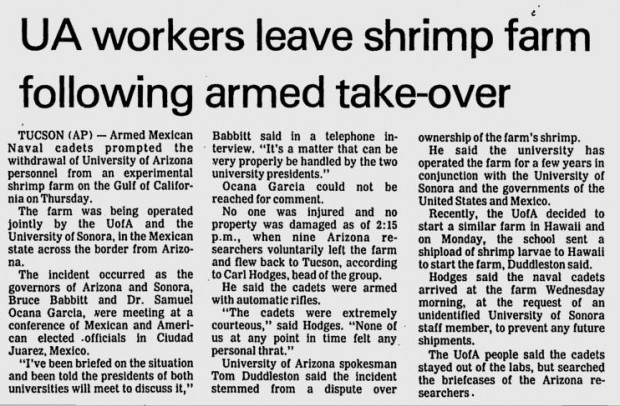By Steve Schwab
 From newspaper accounts of the events that took place in June of 1980, all was not quiet on the shrimp farm when U of A students, under cover of darkness, secretly spirited from the lab 150,000 experimental baby shrimp larvae and shipped them to a sister research facility in Hawaii. Their Mexican colleagues were none too pleased with this fishy faux pas, and utilizing whatever necessary inducements the scientists had at their disposal, persuaded eight cadets from the nearby Mexican Naval Academy in Hermosillo to put this hoedown on a lockdown.
From newspaper accounts of the events that took place in June of 1980, all was not quiet on the shrimp farm when U of A students, under cover of darkness, secretly spirited from the lab 150,000 experimental baby shrimp larvae and shipped them to a sister research facility in Hawaii. Their Mexican colleagues were none too pleased with this fishy faux pas, and utilizing whatever necessary inducements the scientists had at their disposal, persuaded eight cadets from the nearby Mexican Naval Academy in Hermosillo to put this hoedown on a lockdown.
According to news accounts of the incident, by Thursday, June 26 1980, the armed cadets took over the facility, keeping a watchful eye over the remaining U of A researchers, scowling menacingly throughout the day and searching the belongings of the scientists as they exited the facility, in an effort to prevent any further Puerto Peñasco purloining. The nine remaining U of A researchers departed the facility on Sunday and headed back to Tucson after U of A research department officials complained that they were being placed “under military duress.”
 At the risk of sounding cheeky, the shrimp really hit the fan when Dr. Hodges stepped in to get all parties involved to chill-out; stating that the entire incident was just a big misunderstanding. According to Hodges, the whole coup d’état was orchestrated by a few Mexican scientists, angry over Hodges complaint to University of Sonora officials about their “poor performance.” According to Hodges, that’s just what scientists do when they get a bad performance review; they call in the Marines!
At the risk of sounding cheeky, the shrimp really hit the fan when Dr. Hodges stepped in to get all parties involved to chill-out; stating that the entire incident was just a big misunderstanding. According to Hodges, the whole coup d’état was orchestrated by a few Mexican scientists, angry over Hodges complaint to University of Sonora officials about their “poor performance.” According to Hodges, that’s just what scientists do when they get a bad performance review; they call in the Marines!
Back in the early 80’s, this kind of whitewash may have flown in the sticks, but the showdown in shrimp-town was far from over. This little sci-fi fiasco couldn’t have come at a worse moment for Arizona Governor Bruce Babbitt, who happened to be in El Paso at the time, attending a meeting with the Border Governors of the US and Mexico. After being briefed on the situation, Babbitt wisely decided that all involved needed to make nice or no TV. “It’s a matter that can be very properly handled by the university presidents themselves” Babbitt told the press “I don’t think it’s necessary for me to get involved.” After some chest puffing, apologizing and whatever other inducements are needed for negotiating, all was well once again in Rocky Point, with the facility returning to normal by the end of the week and the U of A researchers returning to work.
Today, the U of A Rocky Point research facility is no longer in operation, and Dr. Hodges has gone on to become one of the leading experts on climate change and its effects on agriculture and biology. He is the founder of “Seawater Farms” and to date, his most successful project has been the Seawater Farms Eritrea in Africa, providing fresh water to a desert area while also growing a bounty of fruits and vegetables.
